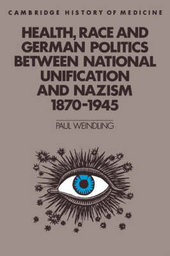
|
Health, Race and German Politics between National Unification and Nazism, 1870-1945
Paperback / softback
Main Details
| Title |
Health, Race and German Politics between National Unification and Nazism, 1870-1945
|
| Authors and Contributors |
By (author) Paul Weindling
|
| Series | Cambridge Studies in the History of Medicine |
|---|
| Physical Properties |
| Format:Paperback / softback | | Pages:660 | | Dimensions(mm): Height 227,Width 151 |
|
| ISBN/Barcode |
9780521423977
|
| Classifications | Dewey:362.10943 |
|---|
| Audience | | Professional & Vocational | |
|---|
| Illustrations |
10 Tables, unspecified; 9 Line drawings, unspecified
|
|
Publishing Details |
| Publisher |
Cambridge University Press
|
| Imprint |
Cambridge University Press
|
| Publication Date |
22 July 1993 |
| Publication Country |
United Kingdom
|
Description
Based on a wealth of hitherto neglected archival sources, this study analyzes the origins, social composition and impact of eugenics in the context of the social and political tension of the rapidly industrializing Nazi empire. Until recently, historians of German racism have limited their analysis of the origins of the Holocaust to a handful of volkisch racial ideologies, overlooking the effects of racial ideas on biology, on the rapidly expanding medical profession and on public health services. Historians of medicine and social and political historians of modern Germany will be interested in this important book.
Reviews'Weindling's book is a major contribution to an important subject. It brings a mass of fascinating detail to bear on the medical origins of Nazi exterminism. And will be required reading for all serious students of modern German history.' Times Higher Education Supplement '... describes in horrifying detail how the German doctors' fear of an imagined national deterioration of one kind led them into complicity with a government whose degeneracy of another kind was all too real.' London Review of Books 'Paul Weindling's book is very good indeed ... [it] needs to be read by anyone embarking on a cultural history of the European world of 1900'. Norman Stone, The Guardian
|